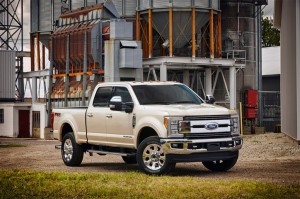
Ford posted substantial sales increase in February, due in large measure to improved F-Series results.
With the seasonally adjusted annual rate of sales or SAAR running at better than 17.7 million units, the U.S. auto industry continued to chalk up healthy sales numbers with Ford Motor Co. Nissan and Fiat Chrysler posting double-digit sales increases.
Ford’s U.S. sales were up 20% in February versus a year ago with 217,192 vehicles sold. Retail sales grew 11% – the company’s best February since 2005. F-Series sales were strong, with 60,697 vehicles sold – a 10% increase – marking Ford’s best February for F-Series in a decade.
“We saw a solid industry last month and a strong month for Ford, as customer demand for our newest vehicles, helped Ford increase its average transaction prices at almost double the industry average,” said Mark LaNeve, Ford vice president, U.S. Marketing, Sales and Service.
Fiat Chrysler reported U.S. sales increased 12% last month compared with sales in February, keeping alive the company’s long string of monthly sales increases, which is now just short of six years old.
“Continued strong consumer demand for our Jeep vehicles drove the Jeep brand to its best February sales ever, while our Ram pickup truck and Ram vans recorded their best February sales ever,” said Reid Bigland, senior vice president, Sales, FCA North America.
“Overall, FCA US realized its best February sales in 10 years and our 71st consecutive month of year-over-year sales increases.”
FCA U.S. finished the month of February with an 88-day supply of inventory (673,494 units). U.S. industry sales figures for February are internally projected at an estimated 17.9 million units SAAR.
Nissan Group reported total U.S. sales for February 2016 of 130,911 units, an increase of 11% compared with the prior year and also a February record.
Audi reported that its February 2016 sales increased 2.3% to 11,718 vehicles, a total that stands as the brand’s 62nd straight month of record U.S. sales.
(Aston Martin DB11 – “most important car” in marque’s 103-year history. For more, Click Here.)
GM overall sales dropped by less than 1% due to a planned reduction in rental deliveries but retail sales increased, the company reported.
“The redesign of our full-size pickups and SUVs, and the smart bets we made to enter the small crossover and mid-size pickup segments with vehicles like the Chevrolet Trax and Colorado couldn’t have been timed better,” said Kurt McNeil, GM vice president of sales operations.
“The economy is growing, millennials are becoming a major force in the market and we’re doing everything we can to meet retail demand, including increased production of midsize pickups and investing in additional V8 engine capacity,” McNeil said.
GM expects to operate with about a 70-days supply of vehicles throughout the year in most months, with some months higher or lower. February month-end inventories were at a 67-days supply. GM continues to grow retail market share with incentives below domestic companies and other key competitors.
(Click Here for more about Toyota C-HR finally making its debut.)
“We continue to be optimistic about the continued strength of the U.S. economy,” said Mustafa Mohatarem, GM’s chief economist. “Employment remains strong, interest rates remain at historically low levels and gas prices are stable, so we expect auto sales to remain strong for the foreseeable future.”
On the downside, Mazda reported that sales dropped by 10% and Volkswagen of America, which hasn’t been able to sell its diesel models, reported it sales dropped 13% during February.
Meanwhile, transaction prices of Toyota Motor Co., Fiat Chrysler, General Motors and Ford continue to increase with help primarily from their utility and truck models, according to Kelley Blue Book.
In addition, American Honda is up slightly at 0.5% with several restyled models showing strength. The all-new Honda Civic drove average transaction prices up 5.5% to $20,782, while the Honda Pilot increased 16.2% to $38,238. However, Hyundai-Kia transaction prices decreased 1.1% in February, with the Hyundai brand dropping 1.6% as dealers sold down the outgoing Elantra model. The redesigned Tucson had the best month for the brand, increasing 11.7% to $27,802.
(Porsche 911 R pays homage to racer past. Click Here to see the story.)
Consumer confidence, a critical factor in the sales of new vehicles, has remained largely unchanged in the past few months, according to the University of Michigan Surveys of Consumers. “The overall stability, however, reflects gains in personal finances being offset by weaker conditions in the overall economy,” observed U-M economist Richard Curtin, who directs the surveys.

how much of all this was sub prime lending ?